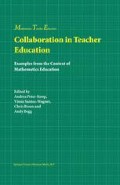Abstract
This chapter reports on a study of classroom coaching as a collaborative approach to professional development. Fourteen high school mathematics teachers were coached in 17 different classes for a combined total of 210 classroom visits in one academic year. Observations were combined with debriefing sessions after each visit and final interviews. The teachers had previously participated in one or two extensive professional development programmes, and the collaborative coaching was originally intended to help determine the impact of the professional development on classroom practices. The chapter discusses teacher behaviours in seven categories that were the focus of observations: equity; multiple representations; technology; student understanding; cooperative groups; alternative assessment; and innovative curriculum. However, the teachers reported that the coaching itself was a critical extension of the professional development. We concluded that classroom coaching, while expensive in resources, can be a crucial element of professional development, because it can help teachers both implement and sustain changes in classroom practice.
The research reported in this chapter was partially supported by the Dwight D. Eisenhower Mathematics and Science State program administered by the California Post-secondary Education Commission (CPEC) grant #785-5. The professional development projects discussed were funded by the Commission (#785-7) and the National Science Foundation (NSF) Teacher Enhancement Program, grant # 9155282. The opinions expressed here are those of the authors only and do not represent the views of the Commission or the National Science Foundation. Portions of this research were presented in 1999 at the annual meetings of the International Group for the Psychology of Mathematics Education and the North American Chapter of the International Group for the Psychology of Mathematics Education.
Access this chapter
Tax calculation will be finalised at checkout
Purchases are for personal use only
Preview
Unable to display preview. Download preview PDF.
References
Becker, J. R. and Pence, B. J. (1998). Classroom-based research to evaluate a model staff development project in mathematics. In A. Olivier and K. Newstead (Eds.), Proceedings of the 22nd Conference of the International Group for the Psychology of Mathematics Education (vol. 2, pp. 88–95 ). Stellenbosch, South Africa: University of Stellenbosch.
Becker, J. R. and Pence, B. J. (1996). Mathematics teacher development: Connections to change in teachers’ beliefs and practices. In L. Puig and A. Gutiérrez (Eds.), Proceedings of the 20th Conference of the International Group for the Psychology of Mathematics Education (vol. 1, pp. 103–117 ). Valencia, Spain: University of Valencia.
Belenky, M. F., Clinchy, B. M., Goldberger, N. R. and Tarule, J. M. (1986). Women’s ways of knowing: The development of self, voice, and mind. New York: Basic Books.
California Post-secondary Education Commission (1996). Developing teaching professionals: The California Eisenhower State Grant Program Experience 1992–1996. Sacramento, CA: The Commission.
Cooney, T. J. (1994). Research and teacher education: In search of common ground. Journal for Research in Mathematics Education, 25 (6), 608–636.
Fennema, E. and Franke, M. (1992). Teachers’ knowledge and its impact. In D.A. Grouws (Ed.), Handbook of research on mathematics teaching and learning (pp. 147–164). New York: Macmillan.
Grouws, D. (1988). Overview of the role of research on mathematics teaching and learning in improving research in classroom instruction and teacher education. Paper presented at the First Wisconsin Symposium on Teaching and Learning Mathematics, Madison, Wisconsin.
Kapuscinski, P. (1997). The collaborative lens: A new look at an old research study. In H. Christiansen, L. Goulet, C. Krentz and M. Maeers (Eds.), Recreating relationships: Collaboration and educational reform (pp. 3–12 ). Albany, NY: State University of New York Press.
Kitchen, R. S., Becker, J. R., and Pence, B. J. (1997). Equity, teaching practices, and reform: Mathematics teachers discuss the impact of the San Jose Mathematics Leadership Project. In J.A. Dossey, J. O. Swafford, M. Parmantie and A. E. Dossey (Eds.), Proceedings of the Nineteenth Annual Meeting of the North American Chapter of the International Group for the Psychology of Mathematics Education (pp. 357–364 ). Columbus, OH: ERIC Clearninghouse for Science, Mathematics, and Environmental Education.
Lipman, D. (1995). The storytelling coach. Little Rock, AK: August House.
McCall, G. J., and Simmons, J. L. (1969). Issues in participant observation: A text and reader. Reading, MA: Addison-Wesley.
Peluso, T., Becker, J. R., and Pence, B. J. (1996). Extending the educational conversation: Site based staff development. In E. Jakubowski, D. Watkins and H. Biske (Eds.), Proceedings of the Eighteenth Annual Meeting of the International Group for the Psychology of Mathematics Education (pp. 447452 ). Columbus, OH: The ERIC Clearinghouse for Science, Mathematics, and Environmental Education.
Peluso, T., Pence, B. J. and Becker, J. R. (1994). Developing a community of risk takers. In J. P. da Ponte and J. F. Matos (Eds.), Proceedings of the Eighteenth International Conference for the Psychology of Mathematics Education (vol. 2, pp. 56–63 ). Lisbon: University of Lisbon.
Perry, W. G. (1970). Forms of intellectual and ethical development in the college years. New York: Holt, Rinehart and Winston.
Romberg, T. A. and Carpenter T. P. (1986). Research on teaching and learning mathematics: Two disciplines of scientific inquiry. In M. Wittrock (Ed.), Handbook of research on teaching (pp. 850873 ). New York: Macmillan.
Sallee, T. and Kysch, J. (1996). College preparatory mathematics: Major change from within. Sacramento, CA: College Prep Math Educational Program.
Shulman, L. (1986). Those who understand: Knowledge growth in teaching. Educational Researcher, 15 (2), 4–14.
Thompson, A. (1992). Teachers’ beliefs and conceptions: A synthesis of the research. In D.A. Grouws (Ed.), Handbook of research on mathematics teaching and learning (pp. 127–146 ). New York: Macmillan.
Author information
Authors and Affiliations
Editor information
Editors and Affiliations
Rights and permissions
Copyright information
© 2003 Springer Science+Business Media Dordrecht
About this chapter
Cite this chapter
Becker, J.R., Pence, B.J. (2003). Classroom Coaching as a Collaborative Activity in Professional Development. In: Peter-Koop, A., Santos-Wagner, V., Breen, C., Begg, A. (eds) Collaboration in Teacher Education. Mathematics Teacher Education, vol 1. Springer, Dordrecht. https://doi.org/10.1007/978-94-017-1072-5_6
Download citation
DOI: https://doi.org/10.1007/978-94-017-1072-5_6
Publisher Name: Springer, Dordrecht
Print ISBN: 978-90-481-6327-4
Online ISBN: 978-94-017-1072-5
eBook Packages: Springer Book Archive

